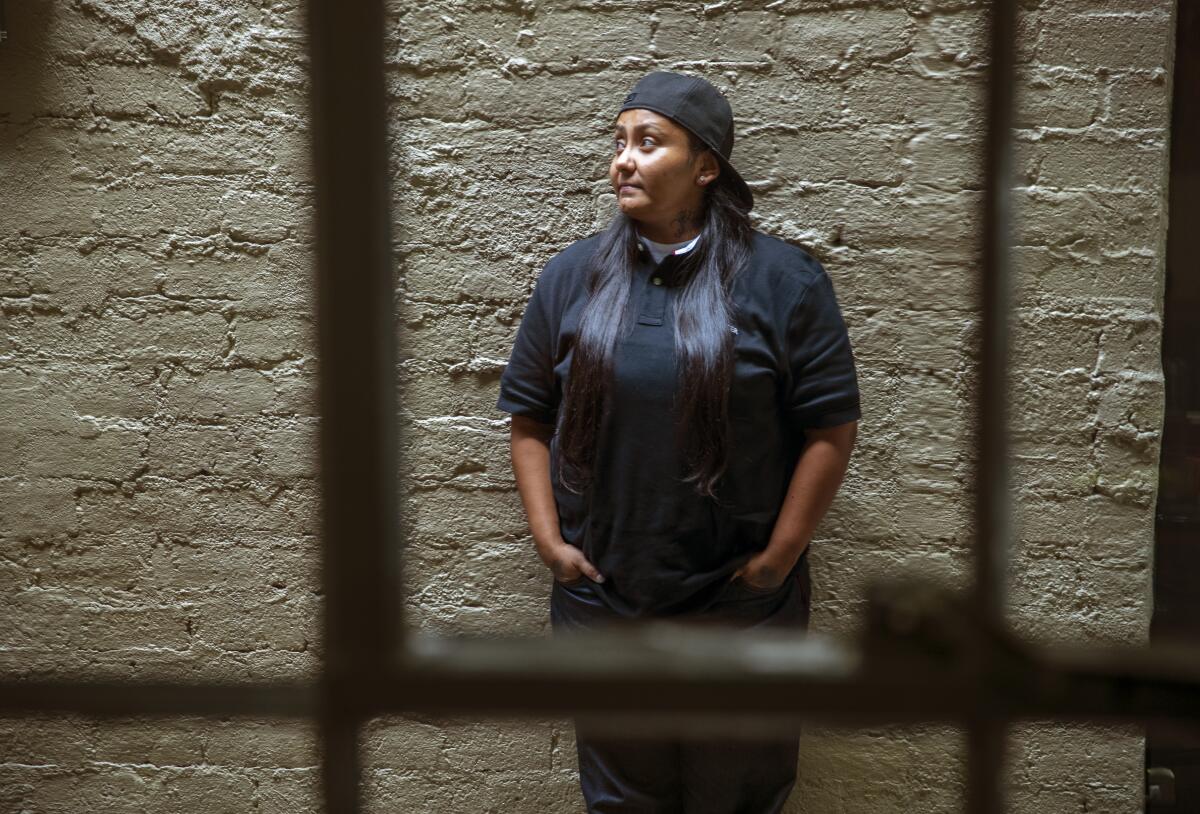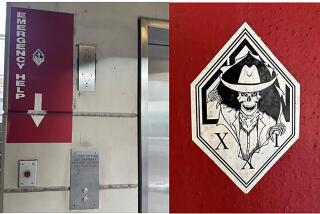Women in jail endured group strip searches. L.A. County to pay $53 million to settle suit

During her brief incarceration several years ago, Jessica Almaraz said she was ushered into a dirty bus garage with 60 or so other inmates at a women’s jail in Lynwood.
The inmates, some of whom were menstruating, were told to remove their clothes and lift and spread their body parts, in full view of one another. Deputies yelled degrading comments and profanities as they made their orders. Some laughed.
“They wanted to make us feel powerless,” said Almaraz, 34, who said she was strip-searched five times during the few weeks she spent in jail. “Whatever they said went, even if it meant making you feel like you’re not human.”
A judge found the invasiveness of the strip searches — that the women had to expose their genitals in large groups, without any privacy — violated their 4th Amendment rights. Now thousands of former inmates, including Almaraz, are eligible to collect a share of a $53-million settlement as part of an agreement filed Tuesday in a class-action lawsuit.
Los Angeles County agreed to the largest settlement payout on record in county history to end the 2010 lawsuit over search practices at the Sheriff’s Department’s Century Regional Detention Facility.
The settlement comes amid a shift in philosophy about mass incarceration and at a time when women for the first time ever hold four of the five seats on the Los Angeles County Board of Supervisors. The change on the board has come with increasingly progressive stances, especially on issues that affect women in the criminal justice system. The board has recently pushed to recruit more women to county agencies and to implement more vocational training for women and female youths incarcerated in county facilities.
The county does not admit wrongdoing and said in the settlement that the agreement was to avoid the cost of further litigation. But the jail has since started using body scanners and privacy curtains to conduct body cavity searches. And part of the payout — up to $3 million — will be used to pay two outside consultants to evaluate and offer recommendations on jail policies and operations that specifically address difficulties faced by female inmates, many of whom have histories of physical or sexual abuse.
Barry Litt, an attorney representing the inmates, said the stories of the women who endured the strip searches are reflective of a rampant culture of abuse that has persisted in the jail for years.
“Ultimately, the reason that they could do this is because the attitude of deputies is that inmates really aren’t human,” Litt said. “If you don’t transform the culture, the problem pops up again.”
The county said in a statement that the settlement marks a “significant resolution of a deeply troubling period” in which tens of thousands of women were strip-searched with intrusive methods and inadequate privacy.
“The County is profoundly concerned about the practices that gave rise to this lawsuit, and is committed to making sure that reforms instituted by the Sheriff’s Department since 2016 will continue to build a culture that prioritizes safety, dignity and respect for inmates and staff,” the statement said.
The Sheriff’s Department stopped routinely strip-searching female inmates in April 2016, when it began using body scanners as its primary screening method. Now, 98% of female inmates are screened using body scanners, the county said. Plaintiffs’ attorneys said only inmates who are pregnant or otherwise refuse a body scan are strip-searched.
“We hope that this settlement will help bring healing and closure to the women affected by past practices, even as it underscores our determination to continue on the path of justice system reform,” the county said.
The settlement applies to more than 93,000 women incarcerated between March 2008 and January 2015. The most intrusive search conditions were in place before July 2011, and the least intrusive conditions occurred after February 2014, when officials enclosed the bus bay and kept it heated. They began using a scanner later that year. Privacy partitions were made available starting early in 2015.
When the lawsuit was first filed in 2010, jail officials told the attorneys that installing curtains was “not feasible,” said Lindsay Battles, another attorney representing the inmates. But they later tasked the jail’s inmate sewing group to make the partitions — at a cost of $4,000, Battles said.
The strip searches were conducted in groups of 20 to 60 people, sometimes more, according to court documents. In the larger groups, inmates had to stand so close to one another that they couldn’t help but touch.
“Inmates could not avoid seeing each others’ bare bodies,” a plaintiffs’ filing said. “They could see pubic area, stretch marks, breasts missing from mastectomies, surgery scars and tattoos.”
In 2013, the jail implemented a new policy limiting strip searches to groups of 24, court documents show.
During one part of the search, inmates were ordered to bend over and spread their genitalia with their hands — in full view of other inmates — so deputies could inspect their bodies. Litt said the search, which typically lasted three to five minutes, was a departure from the more common “squat and cough” practice used in jails.
In one search, a woman expelled her IUD. Those who were menstruating were told to remove their tampons, which left them bleeding on themselves and the ground.
Battles, who has interviewed hundreds of women in the case, said the way they were treated by deputies is what has left the most permanent damage.
“What stands out in most of their minds is the really dehumanizing language that the deputies used to them during the strip searches,” Battles said.
The plaintiffs alleged that deputies made disparaging and degrading comments laced with profanity, the filing said. Deputies called skinny women “crackheads” and heavier women “two tons of fun,” the filing said. They criticized women for their pubic hair or body odor. When deputies thought a woman smelled bad, they sometimes sprayed Lysol or air freshener on her body.
During her first search, Almaraz said, she removed the wrong garment by mistake. A deputy yelled a profanity at her, asking her whether she was stupid.
“It’s a very confusing and really demeaning type of way to search somebody,” Almaraz said.
Almaraz said she was searched each time she returned from a court appearance, and never saw deputies recover any contraband.
One inmate, Sally Martinez, said she lost control of her bowels during a search, according to the plaintiffs’ filing. She tried to tell deputies that she carried hepatitis, but they did not make an effort to clean up the feces.
Litt said hundreds of inmates described the lot as dirty, with trash strewn across the ground, overflowing garbage bins and piles of leaking trash bags. Some saw urine, vomit and feces on the concrete.
Trails of ants sometimes crawled into clothing set on the pavement, the filing said. Inmates saw spiders, roaches, dead birds and droppings. During one strip search, an inmate saw deputies trying to kill a bird with pepper spray. Deputies left rat traps in the search area — one inmate had to stand naked for nearly 30 minutes while deputies tried to catch a mouse running around during a search.
Searches were often done at night. Attorneys for the inmates said that the Sheriff’s Department ignored its own policy that prohibited searches when temperatures fell below 68 degrees. A plaintiffs’ expert concluded from sheriff’s records that nearly 40% of the searches were done in temperatures 65 degrees or below, the filing said.
Stephanie Covington, co-director of the Center for Gender and Justice, which is one of the consultants referenced in the settlement, called the group strip search practice “outrageous” and said there have been other complaints about cleanliness, lack of programming and overcrowding at the Lynwood jail.
“The policies and practices have to be rethought,” she said. “If you do this through a gender lens, you’re going to have a safer prison.”
Almaraz, of South L.A., said that she still has trouble changing in public restrooms, and even in front of her sisters, and has felt ashamed of her body.
“It felt like I was being treated like an animal,” she said. “Worse than an animal.”
When the settlement is approved by a judge, a notice will be posted on the Sheriff’s Department website and a special website will be set up with information on how to file a claim.
More to Read
Start your day right
Sign up for Essential California for news, features and recommendations from the L.A. Times and beyond in your inbox six days a week.
You may occasionally receive promotional content from the Los Angeles Times.







